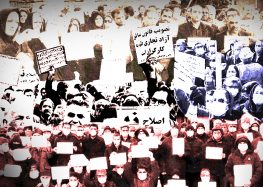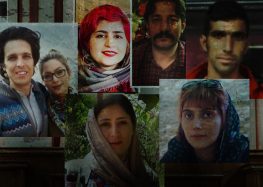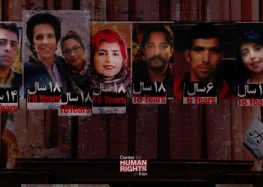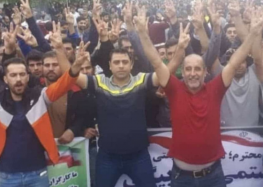Fatal Workplace Fire Highlights Need for Independent Workers Unions
 Protesting labor activists violently attacked
Protesting labor activists violently attacked
(29 May 2008) Security forces and riot police attacked a peaceful gathering of thousands of workers from the Haft-Tapeh Sugar factory in the southern Iranian city of Shush on 26 May 2008, detaining 12 workers. The workers have been demonstrating for the past 21 days demanding unpaid wages for the past three months as well as the resignation of management and representatives of the Intelligence Ministry, and an end to the prosecution of many workers who have been detained and put on trial.
The ban on independent workers organizations in Iran exposes them to unsafe and dangerous conditions. On 25 May 2008, fires destroyed two chemical factories in Shazand near the city of Arak and took the lives of at least 30 workers while injuring another 50 workers, whose condition is reportedly grave. According to local fire department officials, the factory building was unsafe and operations should have ceased there.“The right to a safe working environment is internationally recognized but unfortunately routinely violated, along with a host of other labor rights, in Iran. Governments are responsible for enforcing these regulations and independent workers organizations are essential to ensuring implementation. The urgency of establishing independent workers organizations in Iran is highlighted by this tragic accident, which could likely have been prevented,” the International Campaign for Human Rights in Iran said.
The attack on Haft Tapeh workers is the third time the authorities have resorted to violence during the latest round of protests that started on 8 April 2008. Workers’ families led a protest march on 18 May, with workers’ wives holding up their children and chanting, “This child is hungry, promises will not feed him.” According to the wives participating in the protest, security forces attacked them, beating them with batons and using at least 20 tear gas canisters against them. Many workers suffered injury and at least one was hospitalized, eyewitnesses told the Campaign. Subsequently, the authorities detained 26 workers on 21 May, who were planning to join a protest as five of their colleagues were being put on trial. They have since been released but are subject to further prosecution.
The government’s resort to violence to deny workers their internationally guaranteed right to peaceful assembly is coupled with the systematic denial of workers’ demands to form independent organizations by security forces and other authorities. The workers have stated that the only solution to the current crisis is formation of independent workers syndicates.
The Campaign wishes to acknowledge as a positive development the order by the head of Iran’s Judiciary Hashemi Shahroudi to drop sentences against 11 workers in Kurdistan who participated in May Day observances in 2007 and the release of Sheys Amani, an imprisoned worker in Kurdistan.
“It is good that some Iranian officials are aware of the ramifications of gross human rights violations, both for the welfare of the Iranian people and for Iran’s international relations. But this order is not sufficient to address workers’ extensive grievances. The Judiciary should hold accountable the officials who imprisoned Amani for a month,” the Campaign said.
However, the situation of Javanmir Moradi and Tahe Azadi, both imprisoned for May Day 2007 events, remains unresolved. In addition, the authorities have not provided any information regarding the detention of another Kurdish labor activist, Bakhtiar Rahimi who is currently held in Tehran’s Evin prison. Mansour Ossanloo, leader of the Tehran Bus Drivers Union, remains in prison, serving a five- year term for promoting workers’ fundamental rights. Protesting workers of Haft Tapeh factory are regularly attacked and prosecuted.
The Campaign called on the Iranian Judiciary to immediately drop all charges brought against workers in relation to their peaceful gatherings and trade-union activities.
“The situation of Iranian workers is rapidly deteriorating and formation of independent organizations is essential for ending this crisis,” the Campaign said.






